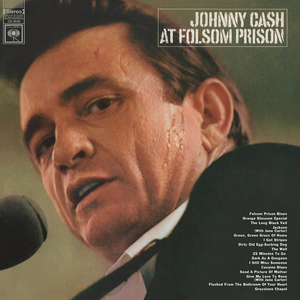
At Folsom Prison
Johnny Cash at Folsom Prison is the first live album by American singer-songwriter Johnny Cash, released on Columbia Records on May 6, 1968. After his 1955 song "Folsom Prison Blues", Cash had been interested in recording a performance at a prison. His idea was put on hold until 1967, when personnel changes at Columbia Records put Bob Johnston in charge of producing Cash's material. Cash had recently controlled his drug abuse problems, and was looking to turn his career around after several years of limited commercial success. Backed by June Carter, Carl Perkins, and the Tennessee Three, Cash performed two shows at Folsom State Prison in California on January 13, 1968. The initial release of the album consists of fifteen songs from the first show and two from the second.
At Folsom Prison
May 6, 1968
January 13, 1968
45:05
Despite little initial promotion by Columbia, Johnny Cash at Folsom Prison was a hit in the United States, reaching number one on the country charts and the top 15 of the national album chart. The lead single, a live version of "Folsom Prison Blues", was a top 40 hit, Cash's first since 1964's "Understand Your Man". At Folsom Prison received positive reviews and revitalized Cash's career, becoming the first in a series of live albums recorded at prisons that includes At San Quentin (1969), På Österåker (1973), and A Concert Behind Prison Walls (1976). The album was rereleased with additional tracks in 1999, a three-disc set in 2008, and a five LP box set with bonus rehearsals in 2018 for Record Store Day. It was certified triple platinum in 2003 for US sales exceeding 3.4 million.
Background[edit]
Johnny Cash became interested in Folsom State Prison, California, while serving in the United States Air Force Security Service. In 1953, his unit watched Crane Wilbur's 1951 film Inside the Walls of Folsom Prison. The film inspired Cash to write a song that reflected his perception of prison life.[1] The result was "Folsom Prison Blues", Cash's second single on Sun Records. The song became popular among inmates, who would write to Cash, requesting him to perform at their prisons.[2] Cash's first prison performance was at Huntsville State Prison in 1957.[3] Satisfied by the favorable reception, he performed at several other prisons in the years leading up to the Folsom performance in 1968.[3]
A few years after attaining commercial success from songs such as "I Walk the Line", "Understand Your Man", and "Ring of Fire", Cash's popularity waned, in part due to his increasing dependence on drugs.[4] In 1967, Cash sought help for his escalating drug problems, and by the end of the year, began to get clean and try to turn his career around.[5] Concurrently, the country portion of Columbia Records underwent major personnel changes, where Frank Jones and Don Law, who had produced several of Cash's albums, were ousted in favor of Bob Johnston, who was known for his erratic behavior and willingness to disagree with studio executives.[6] Cash saw this as an opportunity to pitch his idea of recording a live album at a prison, which Johnston enthusiastically supported.[7] Johnston called San Quentin State Prison and Folsom, with Folsom being the first to respond.[8]
Credited on 1999 re-issue